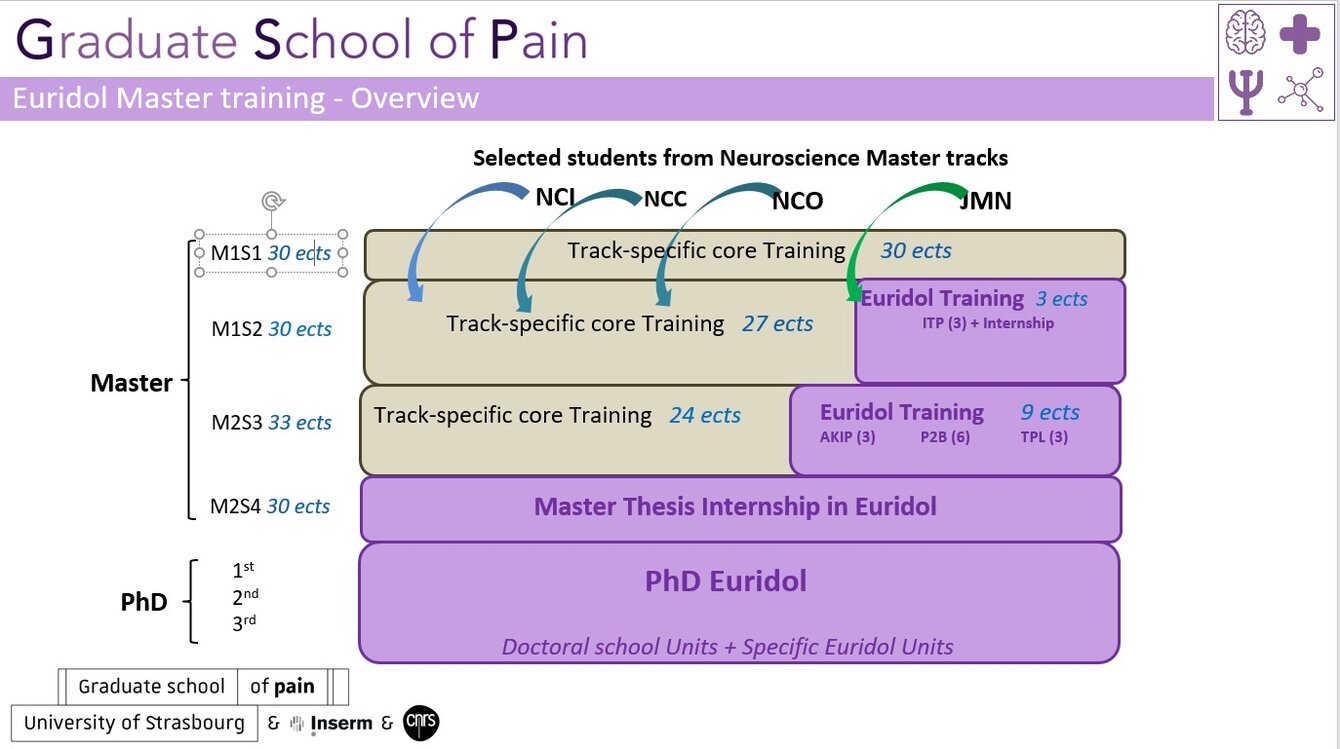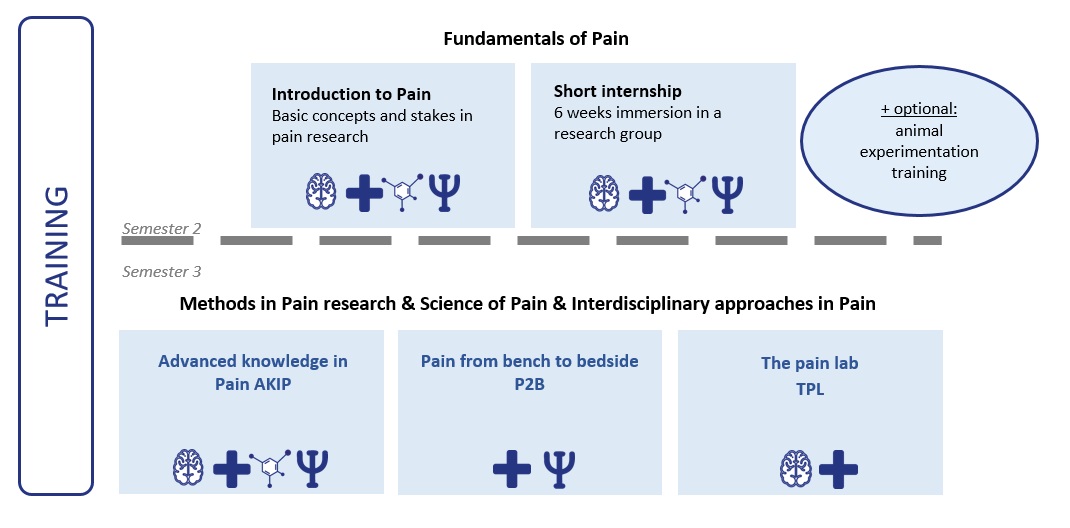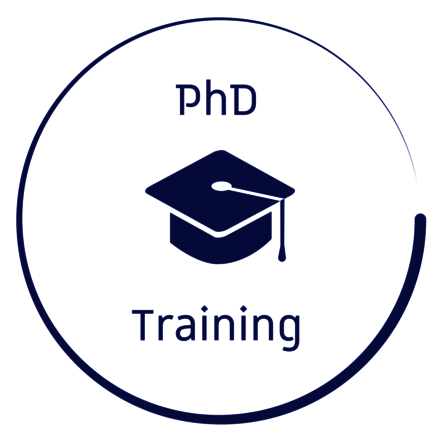Summary
Interdisciplinary Training master's degree in Neuroscience & Pain
The Interdisciplinary Training master's degree in Neuroscience & Pain offers innovative, cross-disciplinary training dedicated to understanding pain, combining several fields of study.
It combines neuroscience, organic, inorganic, and industrial chemistry, sociology and demography, psychology and ergonomics, as well as publichealth, the environment, and society, to offer a comprehensive approach to the mechanisms and issues related to pain.
Detailed information (program, admission requirements, career opportunities) is available on the Faculty of Life Sciences website!
APPLICATIONS OPEN ON FEBRUARY 17th !
Submit your application on MonMaster.
Linking the Neuroscience tracks to EURIDOL
The integrated 5-year graduate programme is mainly aimed at students who wish to obtain a doctorate in neuroscience by carrying out an interdisciplinary research project on pain.
The EURIDOL Master's courses are open to Studentswho are enroled in one of the three Neuroscience Master's tracks of the University of Strasbourg (Joint Master in Neuroscience (JMN) / Neurosciences Cellulaires et Intégrées (NCI) / Neurosciences Cognitives (NCO) / Neuropsychologie Cognitive Clinique (NCC). Detailed information on the admission procedure can be found on the Admissions page.
The EURIDOL Master courses are exclusivelytaught in English, the working language in Neuroscience.
While the 1st semester of the Master's is exclusively dedicated to the respective Neuroscience track (JMN/NCI/NCO/NCC) with 100% track-specific training, semester after semester, the "pain-specific" training becomes the majority:
•The 2nd semester of the Master's is mostly dedicated to track-specific courses: 3 ECTS dedicated to EURIDOL courses.
•The 3rd semester of the Master's is more dedicated to EURIDOL courses with 9 ECTS and 24 ECTS dedicated to track-specific courses.
•The 4th semester of the Master's is exclusively dedicated to the Master work and thesis (final internship) in a EURIDOL team.
EURIDOL Teaching Units
The pain-specific teaching units are mandatory for all EURIDOL students. This specialisation partly replaces the teaching units of the Neuroscience track of origin (JMN/NCI/NCO/NCC).
The EURIDOL teaching units will include several topics:
Fundamentals of Pain, Methods in Pain Research, Science of Pain, and Interdisciplinary Approaches in Pain.
In addition to these mandatory blocks, students have the opportunity to pass the Animal Experimentation Certificate for the "Applicator"-level (level 2)
Introduction to Pain [currently being updated]
Introductory lectures to understand the basics in pain research and treatments
ITP | 3 ECTS
ITP ROF sheet
Timing:
Master 1, Semester 2
Content:
The Introduction to Pain Teaching unit aims to present the fundamental bases of pain within a Neuroscience framework.
A first series of courses presents the major concepts and definitions to differentiate between nociception and pain and to characterize the various components of pain (sensori-discriminative, affective, emotional, cognitive). Sequentially, processes leading from the nociceptive stimulus to the emergence of pain are addressed (detection, integration, transmission, ascending pathways and descending controls, cortical integration, and perception). These notions are illustrated from an experimental standpoint in animals and humans through molecular, cellular, anatomical, (electro)physiological, behavioral, and brain imaging approaches. Beyond the pain theme, the teaching unit thus addresses the cross-sectional study of a function of the nervous system.
A second block of courses presents the current challenges in the field of pain, addressed by specialists: pain research in animals, ethical aspects, human research and clinical practice, pain pharmacology research, and psychosocial aspects.
Targeted skills:
- Acquiring the specific vocabulary of the pain domain,
- Understanding and manipulating the basic concepts of nociception and pain,
- Relating the different aspects of pain and their levels of analysis in animals and humans,
- Understanding the societal implications of fundamental and clinical research on pain.
Person in charge:
Pierre Veinante: veinantep[at]unistra.fr
Technical Internship
A 6-week laboratory internship
INT | 3 ECTS
Master 1 Internship information
Timing:
Master 1, Semester 2
Content:
Immerse into a research team and understand the team's research topic and used techniques.
To contact a EURIDOL research team, browse through the list of laboratories of the Strasbourg Pain Initiative
Advanced Knowledge in Pain [currently being updated]
--------
AKIP | 3 ECTS
Timing:
Master 2, Semester 3
Content:
From various examples of research in the field of pain, this teaching unit illustrates how current knowledge is constructed through scientific research. The courses, conducted in English, combine a portion of scientific lectures presenting the context, hypotheses, experiments, and results that have recently advanced understanding on a given question.
These advancements are presented by the researcher who conducted them, supplemented by a more general course on the state of knowledge. While the majority of the courses are in the field of biology, examples of clinical research, therapeutic chemistry, and human and social sciences will also be presented. These courses will be complemented by tutorial sessions on writing protocols, data analysis, and critical evaluation (reviewing) of scientific articles.
Targeted skills:
- Being able to understand a scientific conference in English, comprehend the underlying scientific approach, and extract the main knowledge to retain,
- Knowing how to design and write a scientific protocol,- Being able to analyze scientific data,
- Knowing how to critically evaluate a scientific publication.
Person in charge:
Michel Barrot: mbarrot[at]unistra.fr
Pain from Bench to Bedside [currently being updated]
------
P2B | 3 ECTS
Timing:
Master 2, Semester 3
Content:
In this teaching unit, research methods used in the human subject and with patients will be presented. This includes both basic and interventional research tools. Examples will be drawn from work and clinical trials currently being carried out at the University of Strasbourg by INSERM and CNRS research laboratories. After a series of theoretical lectures outlining these aspects, students will be asked to prepare a clinical research project on the topic of their choice. The work will be done in pairs and tutored until (1) the production of a state-of-the-art report explaining the project and justifying the desired research and (2) the presentation of the chosen methodology, patient selection, non-inclusion and exclusion criteria.
Targeted skills:
- Knowledge of research methods in human subjects and patients,
- Justifying clinical work to set up a clinical trial after preclinical characterization,
- Identifying the ethical limits and vulnerability factors that may or may not justify a clinical trial.
Person in charge:
Pierrick Poisbeau: poisbeau[at]unistra.fr
The Pain Lab [currently being updated]
------
TPL | 3 ECTS
Timing:
Master 2, Semester 3
Content:
The aim of this course is to enable students to manipulate the research tools used to study pain in both humans and animals. To this end, students will be welcomed on the ComptOpt functional exploration platform and at Ci2N to receive a demonstration of existing tools, which they will then have the opportunity to use in practical work. They will have to draw up a mini research project, find out about the scientific literature on the subject and, when possible, retrieve data for detailed analysis (or work on raw data supplied to them), then perform the statistical analysis. To this end, they will be offered the opportunity to work on behavioral or electrophysiological data processing softwares (brainVision Analyzer, Animaze...).
Targeted skills:
- Implementing tools for measuring pain in animals and humans,
- Understanding the advantages and limitations of these tools,
- Setting up an experimental design with appropriate control groups.
Persons in charge:
Meggane Melchior: mmelchior[at]unistra.fr
Master 2 Internship
A 5 to 6-month research internship
INT | 30 ECTS
Master 2 Internship information
Timing:
Master 2, Semester 4
Objectives:
Integrate into a research team and conduct the Master's work and thesis
To contact a EURIDOL research team, browse through the list of laboratories of the Strasbourg Pain Initiative






